Impact of Organisational Behaviour on 4Com Plc Performance
VerifiedAdded on 2020/06/04
|17
|4774
|38
Report
AI Summary
This report delves into the realm of organisational behaviour, focusing on its impact within the telecommunications company, 4Com Plc. It explores how culture, politics, and power dynamics shape employee behaviour and influence team performance. The report examines various organisational cultures, including power, bureaucratic, collaborative, and task-oriented styles, and their effects on the workplace. It further analyses motivational theories, such as Maslow's hierarchy of needs and equity theory, and their application in enhancing employee productivity and satisfaction. Additionally, the report discusses the factors that contribute to effective team formation and management, including department teams, problem-solving teams, and virtual teams. Overall, the report provides a comprehensive analysis of organisational behaviour principles and their practical implications for improving firm performance and fostering a positive work environment within 4Com Plc.
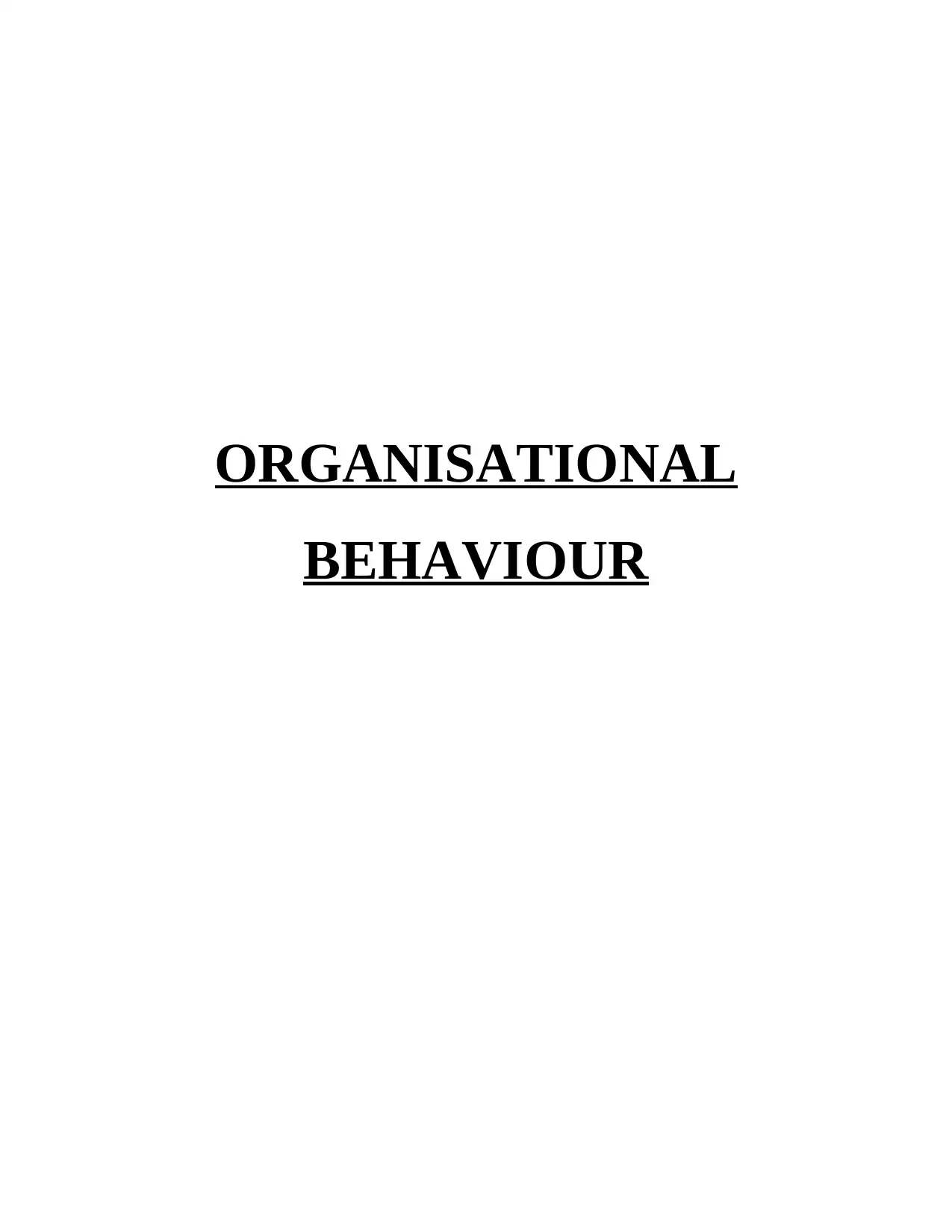
ORGANISATIONAL
BEHAVIOUR
BEHAVIOUR
Paraphrase This Document
Need a fresh take? Get an instant paraphrase of this document with our AI Paraphraser
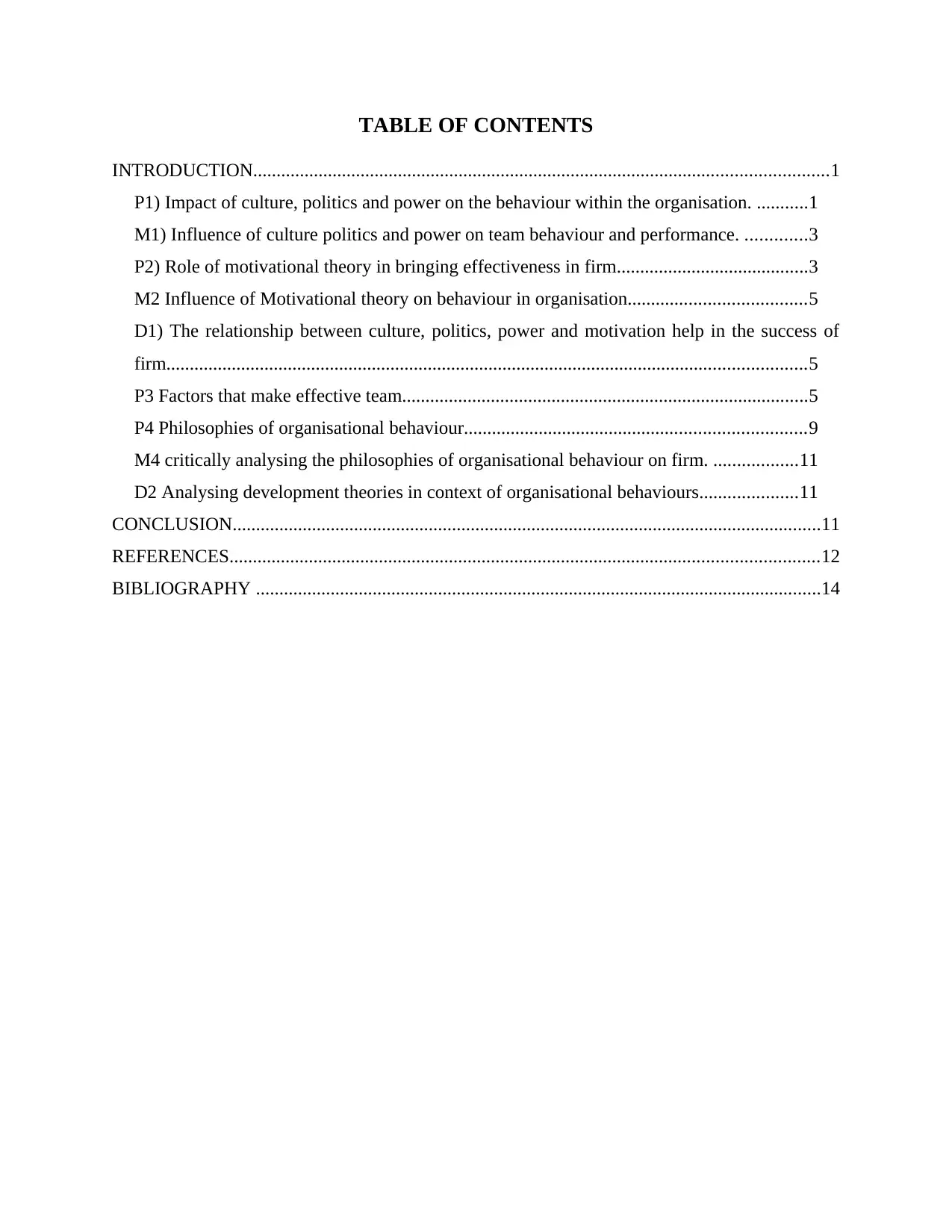
TABLE OF CONTENTS
INTRODUCTION...........................................................................................................................1
P1) Impact of culture, politics and power on the behaviour within the organisation. ...........1
M1) Influence of culture politics and power on team behaviour and performance. .............3
P2) Role of motivational theory in bringing effectiveness in firm.........................................3
M2 Influence of Motivational theory on behaviour in organisation......................................5
D1) The relationship between culture, politics, power and motivation help in the success of
firm.........................................................................................................................................5
P3 Factors that make effective team.......................................................................................5
P4 Philosophies of organisational behaviour.........................................................................9
M4 critically analysing the philosophies of organisational behaviour on firm. ..................11
D2 Analysing development theories in context of organisational behaviours.....................11
CONCLUSION..............................................................................................................................11
REFERENCES..............................................................................................................................12
BIBLIOGRAPHY .........................................................................................................................14
INTRODUCTION...........................................................................................................................1
P1) Impact of culture, politics and power on the behaviour within the organisation. ...........1
M1) Influence of culture politics and power on team behaviour and performance. .............3
P2) Role of motivational theory in bringing effectiveness in firm.........................................3
M2 Influence of Motivational theory on behaviour in organisation......................................5
D1) The relationship between culture, politics, power and motivation help in the success of
firm.........................................................................................................................................5
P3 Factors that make effective team.......................................................................................5
P4 Philosophies of organisational behaviour.........................................................................9
M4 critically analysing the philosophies of organisational behaviour on firm. ..................11
D2 Analysing development theories in context of organisational behaviours.....................11
CONCLUSION..............................................................................................................................11
REFERENCES..............................................................................................................................12
BIBLIOGRAPHY .........................................................................................................................14
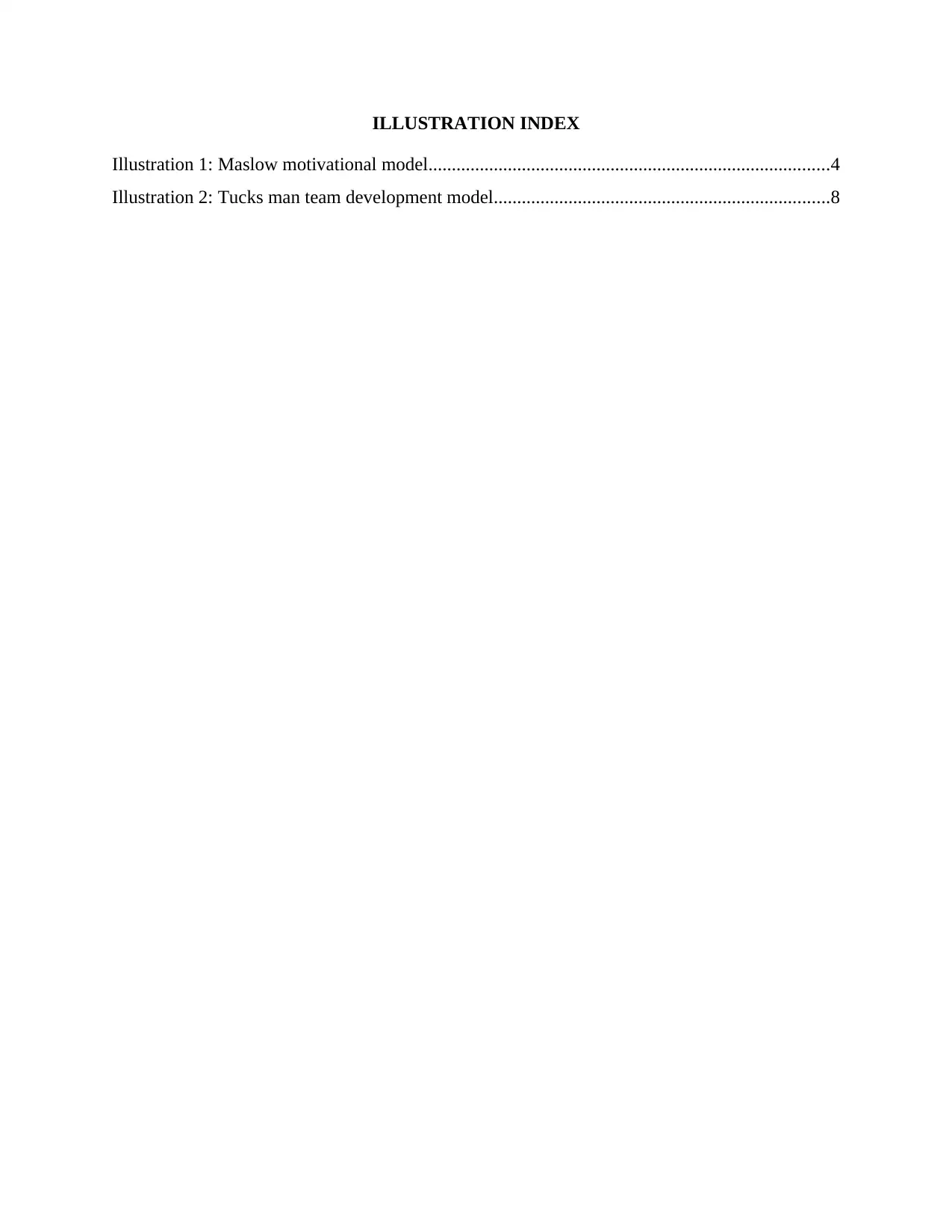
ILLUSTRATION INDEX
Illustration 1: Maslow motivational model......................................................................................4
Illustration 2: Tucks man team development model........................................................................8
Illustration 1: Maslow motivational model......................................................................................4
Illustration 2: Tucks man team development model........................................................................8
⊘ This is a preview!⊘
Do you want full access?
Subscribe today to unlock all pages.

Trusted by 1+ million students worldwide
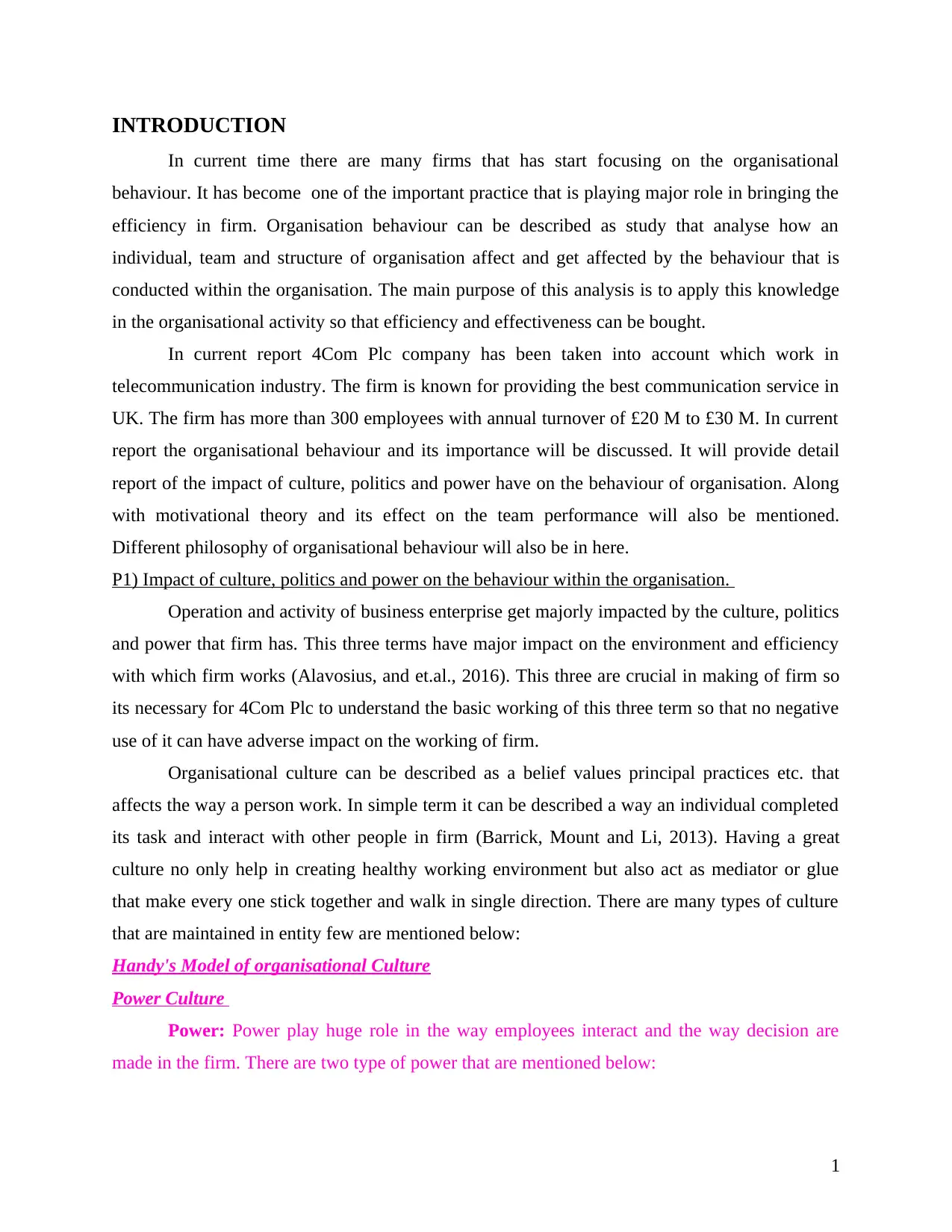
INTRODUCTION
In current time there are many firms that has start focusing on the organisational
behaviour. It has become one of the important practice that is playing major role in bringing the
efficiency in firm. Organisation behaviour can be described as study that analyse how an
individual, team and structure of organisation affect and get affected by the behaviour that is
conducted within the organisation. The main purpose of this analysis is to apply this knowledge
in the organisational activity so that efficiency and effectiveness can be bought.
In current report 4Com Plc company has been taken into account which work in
telecommunication industry. The firm is known for providing the best communication service in
UK. The firm has more than 300 employees with annual turnover of £20 M to £30 M. In current
report the organisational behaviour and its importance will be discussed. It will provide detail
report of the impact of culture, politics and power have on the behaviour of organisation. Along
with motivational theory and its effect on the team performance will also be mentioned.
Different philosophy of organisational behaviour will also be in here.
P1) Impact of culture, politics and power on the behaviour within the organisation.
Operation and activity of business enterprise get majorly impacted by the culture, politics
and power that firm has. This three terms have major impact on the environment and efficiency
with which firm works (Alavosius, and et.al., 2016). This three are crucial in making of firm so
its necessary for 4Com Plc to understand the basic working of this three term so that no negative
use of it can have adverse impact on the working of firm.
Organisational culture can be described as a belief values principal practices etc. that
affects the way a person work. In simple term it can be described a way an individual completed
its task and interact with other people in firm (Barrick, Mount and Li, 2013). Having a great
culture no only help in creating healthy working environment but also act as mediator or glue
that make every one stick together and walk in single direction. There are many types of culture
that are maintained in entity few are mentioned below:
Handy's Model of organisational Culture
Power Culture
Power: Power play huge role in the way employees interact and the way decision are
made in the firm. There are two type of power that are mentioned below:
1
In current time there are many firms that has start focusing on the organisational
behaviour. It has become one of the important practice that is playing major role in bringing the
efficiency in firm. Organisation behaviour can be described as study that analyse how an
individual, team and structure of organisation affect and get affected by the behaviour that is
conducted within the organisation. The main purpose of this analysis is to apply this knowledge
in the organisational activity so that efficiency and effectiveness can be bought.
In current report 4Com Plc company has been taken into account which work in
telecommunication industry. The firm is known for providing the best communication service in
UK. The firm has more than 300 employees with annual turnover of £20 M to £30 M. In current
report the organisational behaviour and its importance will be discussed. It will provide detail
report of the impact of culture, politics and power have on the behaviour of organisation. Along
with motivational theory and its effect on the team performance will also be mentioned.
Different philosophy of organisational behaviour will also be in here.
P1) Impact of culture, politics and power on the behaviour within the organisation.
Operation and activity of business enterprise get majorly impacted by the culture, politics
and power that firm has. This three terms have major impact on the environment and efficiency
with which firm works (Alavosius, and et.al., 2016). This three are crucial in making of firm so
its necessary for 4Com Plc to understand the basic working of this three term so that no negative
use of it can have adverse impact on the working of firm.
Organisational culture can be described as a belief values principal practices etc. that
affects the way a person work. In simple term it can be described a way an individual completed
its task and interact with other people in firm (Barrick, Mount and Li, 2013). Having a great
culture no only help in creating healthy working environment but also act as mediator or glue
that make every one stick together and walk in single direction. There are many types of culture
that are maintained in entity few are mentioned below:
Handy's Model of organisational Culture
Power Culture
Power: Power play huge role in the way employees interact and the way decision are
made in the firm. There are two type of power that are mentioned below:
1
Paraphrase This Document
Need a fresh take? Get an instant paraphrase of this document with our AI Paraphraser
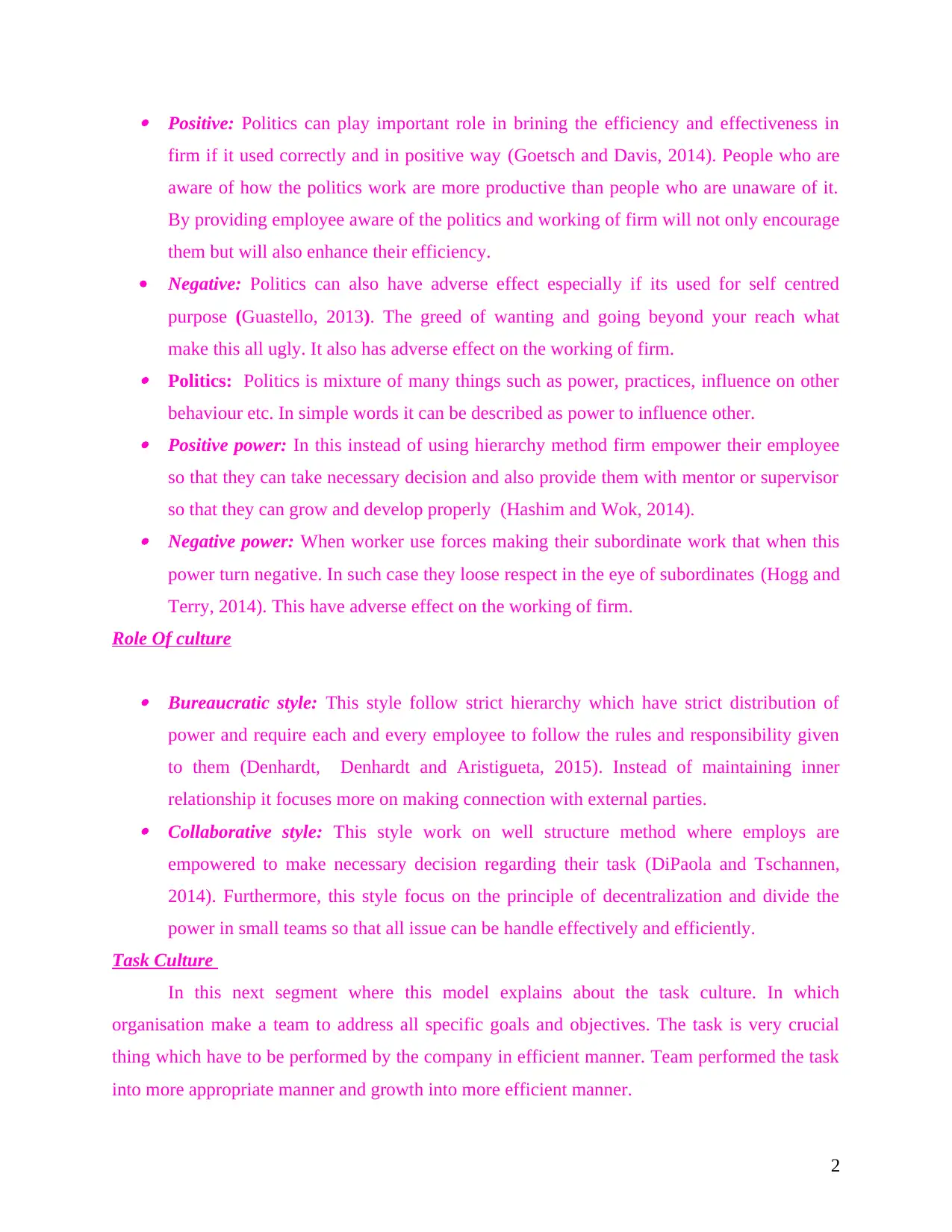
Positive: Politics can play important role in brining the efficiency and effectiveness in
firm if it used correctly and in positive way (Goetsch and Davis, 2014). People who are
aware of how the politics work are more productive than people who are unaware of it.
By providing employee aware of the politics and working of firm will not only encourage
them but will also enhance their efficiency.
Negative: Politics can also have adverse effect especially if its used for self centred
purpose (Guastello, 2013). The greed of wanting and going beyond your reach what
make this all ugly. It also has adverse effect on the working of firm. Politics: Politics is mixture of many things such as power, practices, influence on other
behaviour etc. In simple words it can be described as power to influence other. Positive power: In this instead of using hierarchy method firm empower their employee
so that they can take necessary decision and also provide them with mentor or supervisor
so that they can grow and develop properly (Hashim and Wok, 2014). Negative power: When worker use forces making their subordinate work that when this
power turn negative. In such case they loose respect in the eye of subordinates (Hogg and
Terry, 2014). This have adverse effect on the working of firm.
Role Of culture
Bureaucratic style: This style follow strict hierarchy which have strict distribution of
power and require each and every employee to follow the rules and responsibility given
to them (Denhardt, Denhardt and Aristigueta, 2015). Instead of maintaining inner
relationship it focuses more on making connection with external parties. Collaborative style: This style work on well structure method where employs are
empowered to make necessary decision regarding their task (DiPaola and Tschannen,
2014). Furthermore, this style focus on the principle of decentralization and divide the
power in small teams so that all issue can be handle effectively and efficiently.
Task Culture
In this next segment where this model explains about the task culture. In which
organisation make a team to address all specific goals and objectives. The task is very crucial
thing which have to be performed by the company in efficient manner. Team performed the task
into more appropriate manner and growth into more efficient manner.
2
firm if it used correctly and in positive way (Goetsch and Davis, 2014). People who are
aware of how the politics work are more productive than people who are unaware of it.
By providing employee aware of the politics and working of firm will not only encourage
them but will also enhance their efficiency.
Negative: Politics can also have adverse effect especially if its used for self centred
purpose (Guastello, 2013). The greed of wanting and going beyond your reach what
make this all ugly. It also has adverse effect on the working of firm. Politics: Politics is mixture of many things such as power, practices, influence on other
behaviour etc. In simple words it can be described as power to influence other. Positive power: In this instead of using hierarchy method firm empower their employee
so that they can take necessary decision and also provide them with mentor or supervisor
so that they can grow and develop properly (Hashim and Wok, 2014). Negative power: When worker use forces making their subordinate work that when this
power turn negative. In such case they loose respect in the eye of subordinates (Hogg and
Terry, 2014). This have adverse effect on the working of firm.
Role Of culture
Bureaucratic style: This style follow strict hierarchy which have strict distribution of
power and require each and every employee to follow the rules and responsibility given
to them (Denhardt, Denhardt and Aristigueta, 2015). Instead of maintaining inner
relationship it focuses more on making connection with external parties. Collaborative style: This style work on well structure method where employs are
empowered to make necessary decision regarding their task (DiPaola and Tschannen,
2014). Furthermore, this style focus on the principle of decentralization and divide the
power in small teams so that all issue can be handle effectively and efficiently.
Task Culture
In this next segment where this model explains about the task culture. In which
organisation make a team to address all specific goals and objectives. The task is very crucial
thing which have to be performed by the company in efficient manner. Team performed the task
into more appropriate manner and growth into more efficient manner.
2
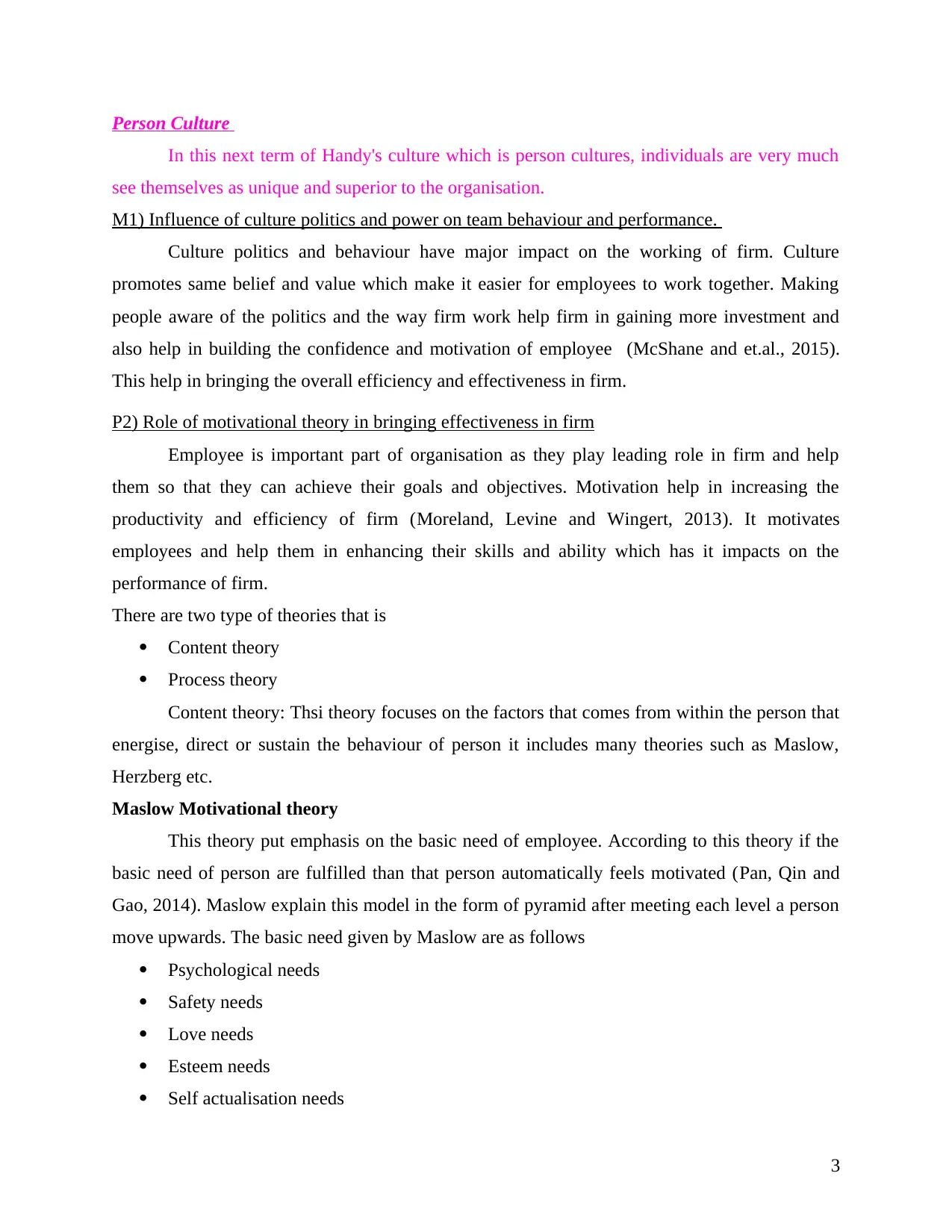
Person Culture
In this next term of Handy's culture which is person cultures, individuals are very much
see themselves as unique and superior to the organisation.
M1) Influence of culture politics and power on team behaviour and performance.
Culture politics and behaviour have major impact on the working of firm. Culture
promotes same belief and value which make it easier for employees to work together. Making
people aware of the politics and the way firm work help firm in gaining more investment and
also help in building the confidence and motivation of employee (McShane and et.al., 2015).
This help in bringing the overall efficiency and effectiveness in firm.
P2) Role of motivational theory in bringing effectiveness in firm
Employee is important part of organisation as they play leading role in firm and help
them so that they can achieve their goals and objectives. Motivation help in increasing the
productivity and efficiency of firm (Moreland, Levine and Wingert, 2013). It motivates
employees and help them in enhancing their skills and ability which has it impacts on the
performance of firm.
There are two type of theories that is
Content theory
Process theory
Content theory: Thsi theory focuses on the factors that comes from within the person that
energise, direct or sustain the behaviour of person it includes many theories such as Maslow,
Herzberg etc.
Maslow Motivational theory
This theory put emphasis on the basic need of employee. According to this theory if the
basic need of person are fulfilled than that person automatically feels motivated (Pan, Qin and
Gao, 2014). Maslow explain this model in the form of pyramid after meeting each level a person
move upwards. The basic need given by Maslow are as follows
Psychological needs
Safety needs
Love needs
Esteem needs
Self actualisation needs
3
In this next term of Handy's culture which is person cultures, individuals are very much
see themselves as unique and superior to the organisation.
M1) Influence of culture politics and power on team behaviour and performance.
Culture politics and behaviour have major impact on the working of firm. Culture
promotes same belief and value which make it easier for employees to work together. Making
people aware of the politics and the way firm work help firm in gaining more investment and
also help in building the confidence and motivation of employee (McShane and et.al., 2015).
This help in bringing the overall efficiency and effectiveness in firm.
P2) Role of motivational theory in bringing effectiveness in firm
Employee is important part of organisation as they play leading role in firm and help
them so that they can achieve their goals and objectives. Motivation help in increasing the
productivity and efficiency of firm (Moreland, Levine and Wingert, 2013). It motivates
employees and help them in enhancing their skills and ability which has it impacts on the
performance of firm.
There are two type of theories that is
Content theory
Process theory
Content theory: Thsi theory focuses on the factors that comes from within the person that
energise, direct or sustain the behaviour of person it includes many theories such as Maslow,
Herzberg etc.
Maslow Motivational theory
This theory put emphasis on the basic need of employee. According to this theory if the
basic need of person are fulfilled than that person automatically feels motivated (Pan, Qin and
Gao, 2014). Maslow explain this model in the form of pyramid after meeting each level a person
move upwards. The basic need given by Maslow are as follows
Psychological needs
Safety needs
Love needs
Esteem needs
Self actualisation needs
3
⊘ This is a preview!⊘
Do you want full access?
Subscribe today to unlock all pages.

Trusted by 1+ million students worldwide
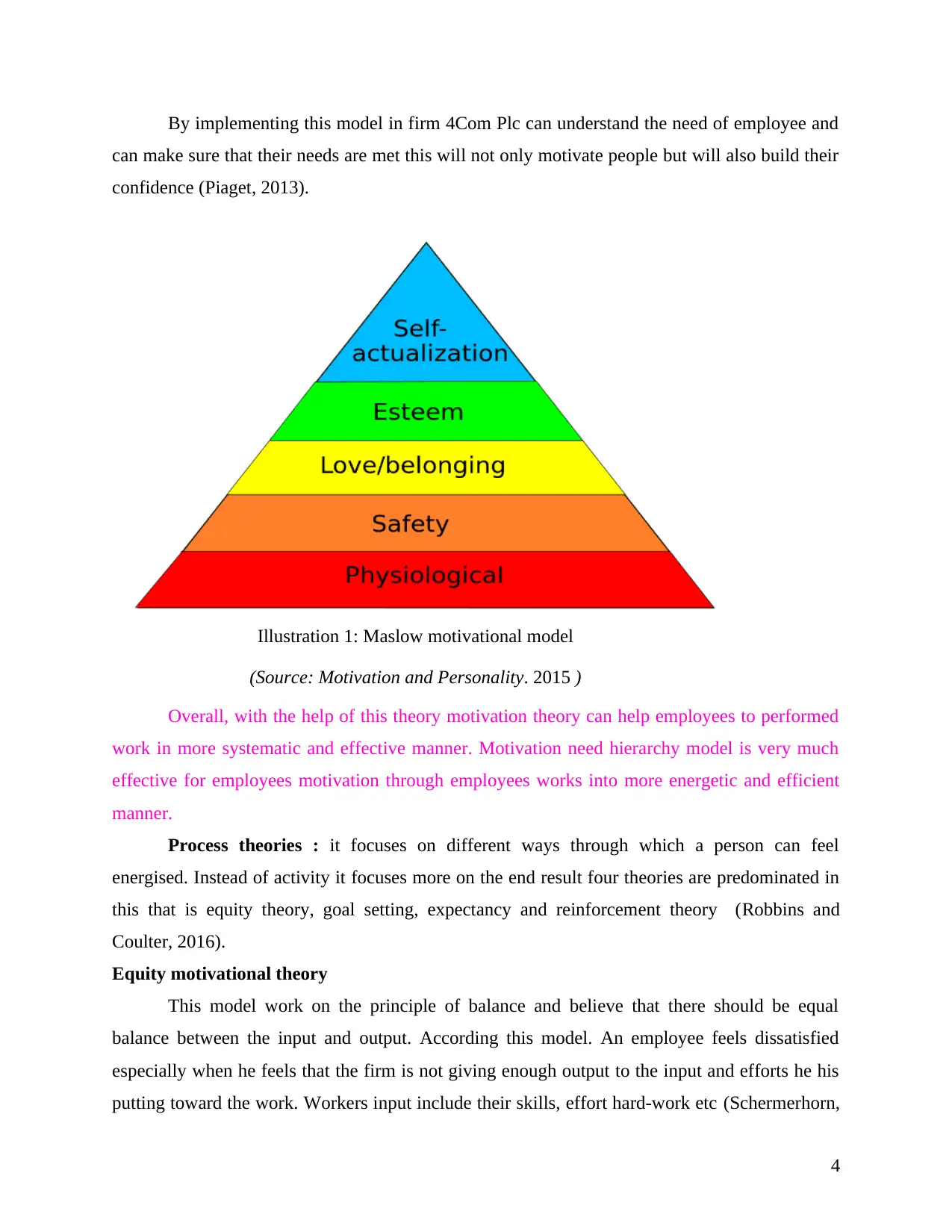
By implementing this model in firm 4Com Plc can understand the need of employee and
can make sure that their needs are met this will not only motivate people but will also build their
confidence (Piaget, 2013).
Illustration 1: Maslow motivational model
(Source: Motivation and Personality. 2015 )
Overall, with the help of this theory motivation theory can help employees to performed
work in more systematic and effective manner. Motivation need hierarchy model is very much
effective for employees motivation through employees works into more energetic and efficient
manner.
Process theories : it focuses on different ways through which a person can feel
energised. Instead of activity it focuses more on the end result four theories are predominated in
this that is equity theory, goal setting, expectancy and reinforcement theory (Robbins and
Coulter, 2016).
Equity motivational theory
This model work on the principle of balance and believe that there should be equal
balance between the input and output. According this model. An employee feels dissatisfied
especially when he feels that the firm is not giving enough output to the input and efforts he his
putting toward the work. Workers input include their skills, effort hard-work etc (Schermerhorn,
4
can make sure that their needs are met this will not only motivate people but will also build their
confidence (Piaget, 2013).
Illustration 1: Maslow motivational model
(Source: Motivation and Personality. 2015 )
Overall, with the help of this theory motivation theory can help employees to performed
work in more systematic and effective manner. Motivation need hierarchy model is very much
effective for employees motivation through employees works into more energetic and efficient
manner.
Process theories : it focuses on different ways through which a person can feel
energised. Instead of activity it focuses more on the end result four theories are predominated in
this that is equity theory, goal setting, expectancy and reinforcement theory (Robbins and
Coulter, 2016).
Equity motivational theory
This model work on the principle of balance and believe that there should be equal
balance between the input and output. According this model. An employee feels dissatisfied
especially when he feels that the firm is not giving enough output to the input and efforts he his
putting toward the work. Workers input include their skills, effort hard-work etc (Schermerhorn,
4
Paraphrase This Document
Need a fresh take? Get an instant paraphrase of this document with our AI Paraphraser
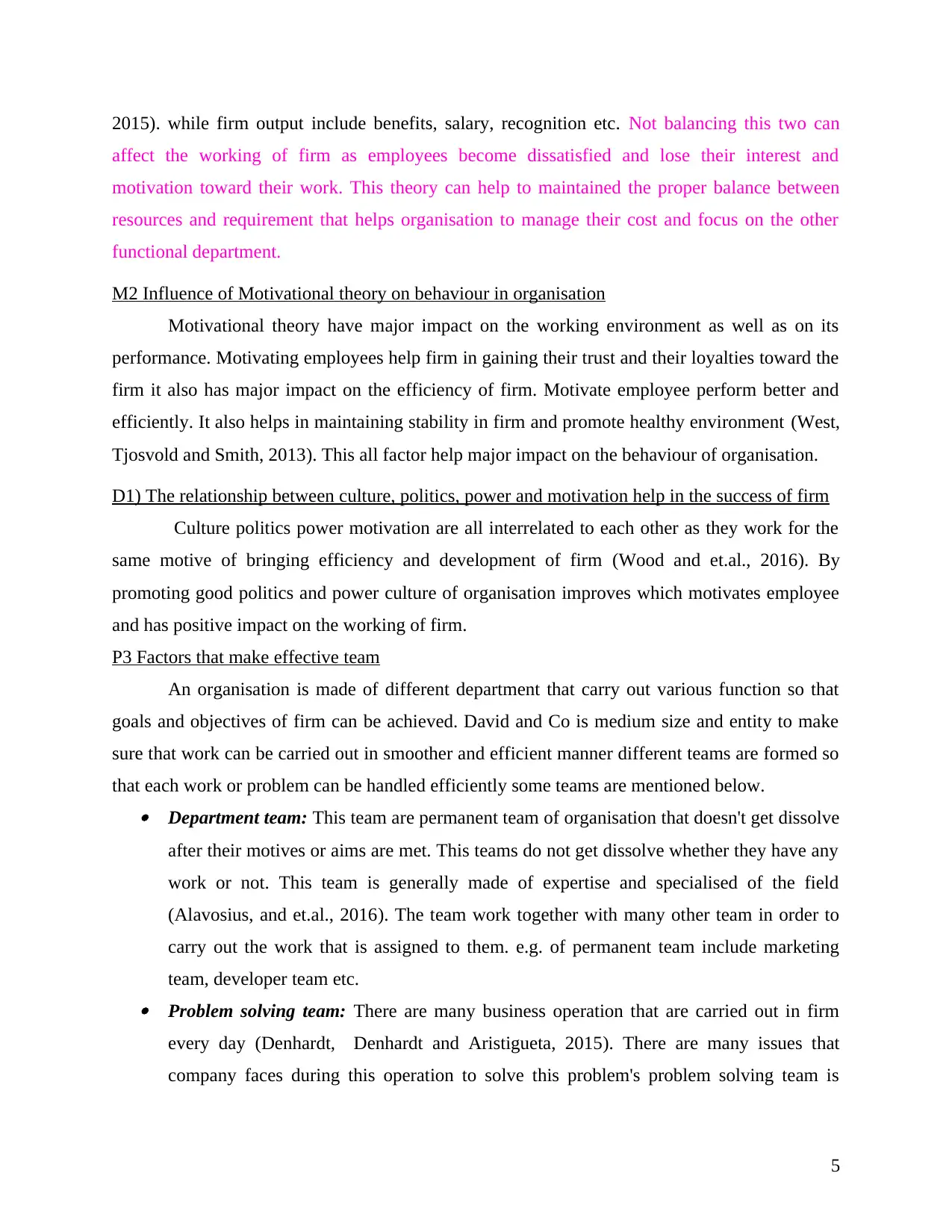
2015). while firm output include benefits, salary, recognition etc. Not balancing this two can
affect the working of firm as employees become dissatisfied and lose their interest and
motivation toward their work. This theory can help to maintained the proper balance between
resources and requirement that helps organisation to manage their cost and focus on the other
functional department.
M2 Influence of Motivational theory on behaviour in organisation
Motivational theory have major impact on the working environment as well as on its
performance. Motivating employees help firm in gaining their trust and their loyalties toward the
firm it also has major impact on the efficiency of firm. Motivate employee perform better and
efficiently. It also helps in maintaining stability in firm and promote healthy environment (West,
Tjosvold and Smith, 2013). This all factor help major impact on the behaviour of organisation.
D1) The relationship between culture, politics, power and motivation help in the success of firm
Culture politics power motivation are all interrelated to each other as they work for the
same motive of bringing efficiency and development of firm (Wood and et.al., 2016). By
promoting good politics and power culture of organisation improves which motivates employee
and has positive impact on the working of firm.
P3 Factors that make effective team
An organisation is made of different department that carry out various function so that
goals and objectives of firm can be achieved. David and Co is medium size and entity to make
sure that work can be carried out in smoother and efficient manner different teams are formed so
that each work or problem can be handled efficiently some teams are mentioned below. Department team: This team are permanent team of organisation that doesn't get dissolve
after their motives or aims are met. This teams do not get dissolve whether they have any
work or not. This team is generally made of expertise and specialised of the field
(Alavosius, and et.al., 2016). The team work together with many other team in order to
carry out the work that is assigned to them. e.g. of permanent team include marketing
team, developer team etc. Problem solving team: There are many business operation that are carried out in firm
every day (Denhardt, Denhardt and Aristigueta, 2015). There are many issues that
company faces during this operation to solve this problem's problem solving team is
5
affect the working of firm as employees become dissatisfied and lose their interest and
motivation toward their work. This theory can help to maintained the proper balance between
resources and requirement that helps organisation to manage their cost and focus on the other
functional department.
M2 Influence of Motivational theory on behaviour in organisation
Motivational theory have major impact on the working environment as well as on its
performance. Motivating employees help firm in gaining their trust and their loyalties toward the
firm it also has major impact on the efficiency of firm. Motivate employee perform better and
efficiently. It also helps in maintaining stability in firm and promote healthy environment (West,
Tjosvold and Smith, 2013). This all factor help major impact on the behaviour of organisation.
D1) The relationship between culture, politics, power and motivation help in the success of firm
Culture politics power motivation are all interrelated to each other as they work for the
same motive of bringing efficiency and development of firm (Wood and et.al., 2016). By
promoting good politics and power culture of organisation improves which motivates employee
and has positive impact on the working of firm.
P3 Factors that make effective team
An organisation is made of different department that carry out various function so that
goals and objectives of firm can be achieved. David and Co is medium size and entity to make
sure that work can be carried out in smoother and efficient manner different teams are formed so
that each work or problem can be handled efficiently some teams are mentioned below. Department team: This team are permanent team of organisation that doesn't get dissolve
after their motives or aims are met. This teams do not get dissolve whether they have any
work or not. This team is generally made of expertise and specialised of the field
(Alavosius, and et.al., 2016). The team work together with many other team in order to
carry out the work that is assigned to them. e.g. of permanent team include marketing
team, developer team etc. Problem solving team: There are many business operation that are carried out in firm
every day (Denhardt, Denhardt and Aristigueta, 2015). There are many issues that
company faces during this operation to solve this problem's problem solving team is
5
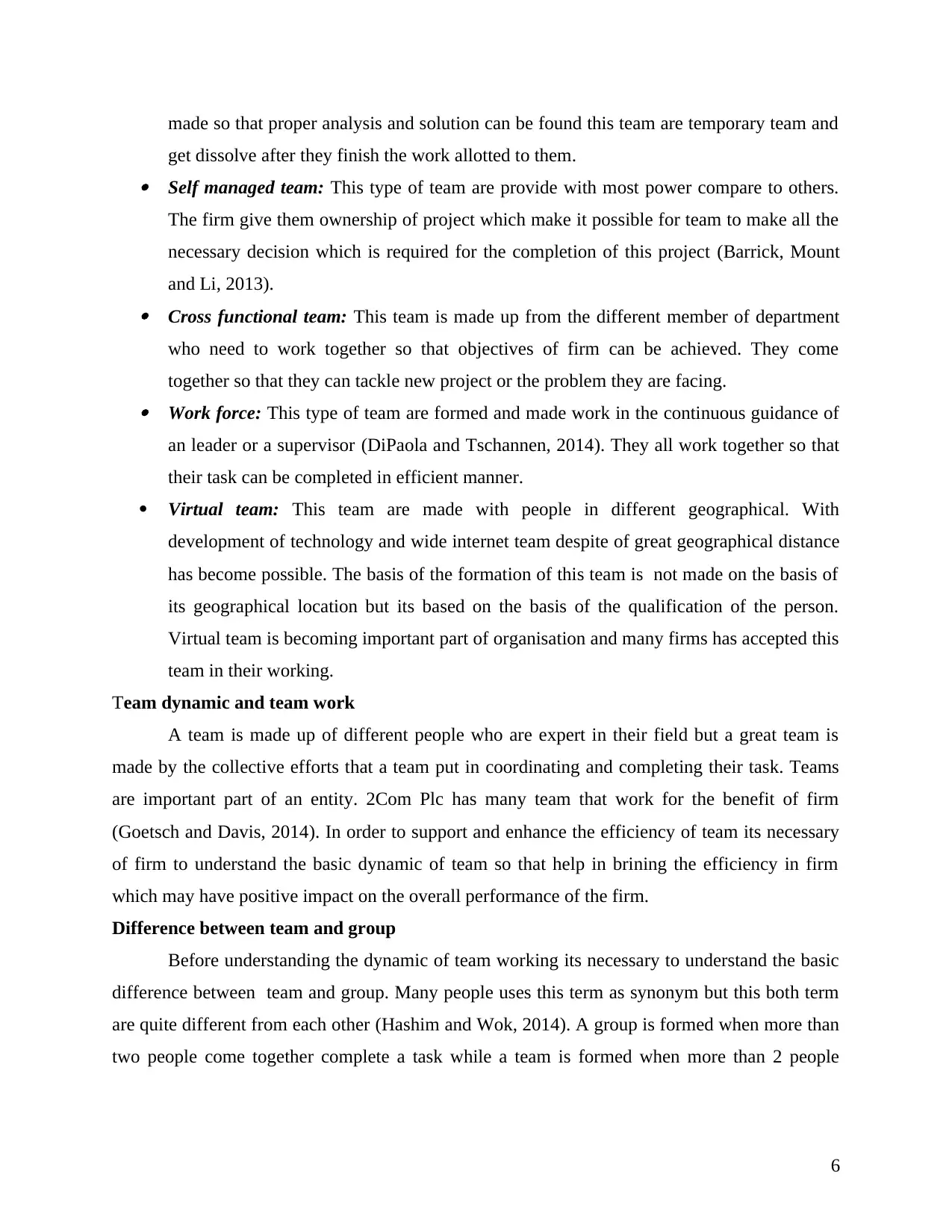
made so that proper analysis and solution can be found this team are temporary team and
get dissolve after they finish the work allotted to them. Self managed team: This type of team are provide with most power compare to others.
The firm give them ownership of project which make it possible for team to make all the
necessary decision which is required for the completion of this project (Barrick, Mount
and Li, 2013). Cross functional team: This team is made up from the different member of department
who need to work together so that objectives of firm can be achieved. They come
together so that they can tackle new project or the problem they are facing. Work force: This type of team are formed and made work in the continuous guidance of
an leader or a supervisor (DiPaola and Tschannen, 2014). They all work together so that
their task can be completed in efficient manner.
Virtual team: This team are made with people in different geographical. With
development of technology and wide internet team despite of great geographical distance
has become possible. The basis of the formation of this team is not made on the basis of
its geographical location but its based on the basis of the qualification of the person.
Virtual team is becoming important part of organisation and many firms has accepted this
team in their working.
Team dynamic and team work
A team is made up of different people who are expert in their field but a great team is
made by the collective efforts that a team put in coordinating and completing their task. Teams
are important part of an entity. 2Com Plc has many team that work for the benefit of firm
(Goetsch and Davis, 2014). In order to support and enhance the efficiency of team its necessary
of firm to understand the basic dynamic of team so that help in brining the efficiency in firm
which may have positive impact on the overall performance of the firm.
Difference between team and group
Before understanding the dynamic of team working its necessary to understand the basic
difference between team and group. Many people uses this term as synonym but this both term
are quite different from each other (Hashim and Wok, 2014). A group is formed when more than
two people come together complete a task while a team is formed when more than 2 people
6
get dissolve after they finish the work allotted to them. Self managed team: This type of team are provide with most power compare to others.
The firm give them ownership of project which make it possible for team to make all the
necessary decision which is required for the completion of this project (Barrick, Mount
and Li, 2013). Cross functional team: This team is made up from the different member of department
who need to work together so that objectives of firm can be achieved. They come
together so that they can tackle new project or the problem they are facing. Work force: This type of team are formed and made work in the continuous guidance of
an leader or a supervisor (DiPaola and Tschannen, 2014). They all work together so that
their task can be completed in efficient manner.
Virtual team: This team are made with people in different geographical. With
development of technology and wide internet team despite of great geographical distance
has become possible. The basis of the formation of this team is not made on the basis of
its geographical location but its based on the basis of the qualification of the person.
Virtual team is becoming important part of organisation and many firms has accepted this
team in their working.
Team dynamic and team work
A team is made up of different people who are expert in their field but a great team is
made by the collective efforts that a team put in coordinating and completing their task. Teams
are important part of an entity. 2Com Plc has many team that work for the benefit of firm
(Goetsch and Davis, 2014). In order to support and enhance the efficiency of team its necessary
of firm to understand the basic dynamic of team so that help in brining the efficiency in firm
which may have positive impact on the overall performance of the firm.
Difference between team and group
Before understanding the dynamic of team working its necessary to understand the basic
difference between team and group. Many people uses this term as synonym but this both term
are quite different from each other (Hashim and Wok, 2014). A group is formed when more than
two people come together complete a task while a team is formed when more than 2 people
6
⊘ This is a preview!⊘
Do you want full access?
Subscribe today to unlock all pages.

Trusted by 1+ million students worldwide
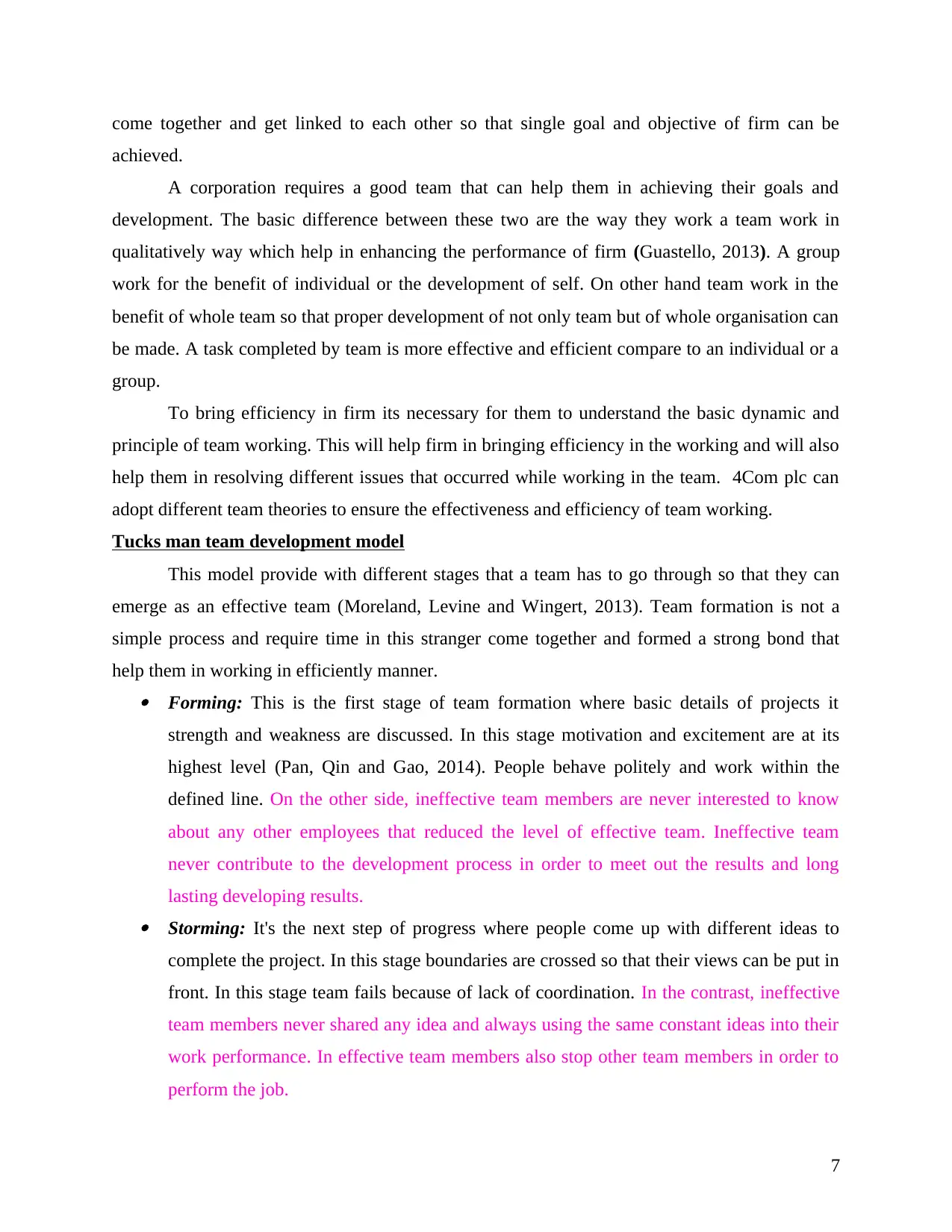
come together and get linked to each other so that single goal and objective of firm can be
achieved.
A corporation requires a good team that can help them in achieving their goals and
development. The basic difference between these two are the way they work a team work in
qualitatively way which help in enhancing the performance of firm (Guastello, 2013). A group
work for the benefit of individual or the development of self. On other hand team work in the
benefit of whole team so that proper development of not only team but of whole organisation can
be made. A task completed by team is more effective and efficient compare to an individual or a
group.
To bring efficiency in firm its necessary for them to understand the basic dynamic and
principle of team working. This will help firm in bringing efficiency in the working and will also
help them in resolving different issues that occurred while working in the team. 4Com plc can
adopt different team theories to ensure the effectiveness and efficiency of team working.
Tucks man team development model
This model provide with different stages that a team has to go through so that they can
emerge as an effective team (Moreland, Levine and Wingert, 2013). Team formation is not a
simple process and require time in this stranger come together and formed a strong bond that
help them in working in efficiently manner. Forming: This is the first stage of team formation where basic details of projects it
strength and weakness are discussed. In this stage motivation and excitement are at its
highest level (Pan, Qin and Gao, 2014). People behave politely and work within the
defined line. On the other side, ineffective team members are never interested to know
about any other employees that reduced the level of effective team. Ineffective team
never contribute to the development process in order to meet out the results and long
lasting developing results. Storming: It's the next step of progress where people come up with different ideas to
complete the project. In this stage boundaries are crossed so that their views can be put in
front. In this stage team fails because of lack of coordination. In the contrast, ineffective
team members never shared any idea and always using the same constant ideas into their
work performance. In effective team members also stop other team members in order to
perform the job.
7
achieved.
A corporation requires a good team that can help them in achieving their goals and
development. The basic difference between these two are the way they work a team work in
qualitatively way which help in enhancing the performance of firm (Guastello, 2013). A group
work for the benefit of individual or the development of self. On other hand team work in the
benefit of whole team so that proper development of not only team but of whole organisation can
be made. A task completed by team is more effective and efficient compare to an individual or a
group.
To bring efficiency in firm its necessary for them to understand the basic dynamic and
principle of team working. This will help firm in bringing efficiency in the working and will also
help them in resolving different issues that occurred while working in the team. 4Com plc can
adopt different team theories to ensure the effectiveness and efficiency of team working.
Tucks man team development model
This model provide with different stages that a team has to go through so that they can
emerge as an effective team (Moreland, Levine and Wingert, 2013). Team formation is not a
simple process and require time in this stranger come together and formed a strong bond that
help them in working in efficiently manner. Forming: This is the first stage of team formation where basic details of projects it
strength and weakness are discussed. In this stage motivation and excitement are at its
highest level (Pan, Qin and Gao, 2014). People behave politely and work within the
defined line. On the other side, ineffective team members are never interested to know
about any other employees that reduced the level of effective team. Ineffective team
never contribute to the development process in order to meet out the results and long
lasting developing results. Storming: It's the next step of progress where people come up with different ideas to
complete the project. In this stage boundaries are crossed so that their views can be put in
front. In this stage team fails because of lack of coordination. In the contrast, ineffective
team members never shared any idea and always using the same constant ideas into their
work performance. In effective team members also stop other team members in order to
perform the job.
7
Paraphrase This Document
Need a fresh take? Get an instant paraphrase of this document with our AI Paraphraser
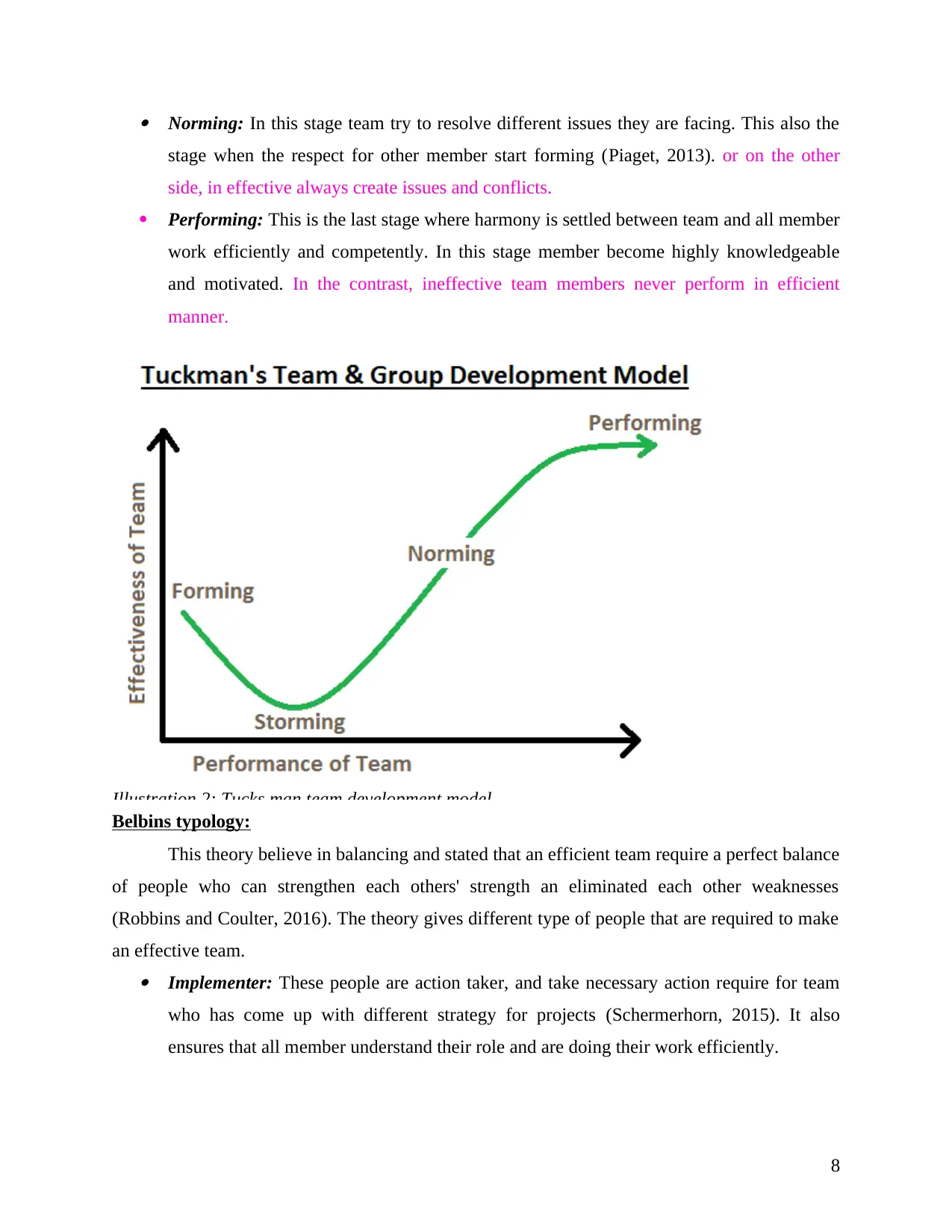
Norming: In this stage team try to resolve different issues they are facing. This also the
stage when the respect for other member start forming (Piaget, 2013). or on the other
side, in effective always create issues and conflicts.
Performing: This is the last stage where harmony is settled between team and all member
work efficiently and competently. In this stage member become highly knowledgeable
and motivated. In the contrast, ineffective team members never perform in efficient
manner.
Illustration 2: Tucks man team development model
Belbins typology:
This theory believe in balancing and stated that an efficient team require a perfect balance
of people who can strengthen each others' strength an eliminated each other weaknesses
(Robbins and Coulter, 2016). The theory gives different type of people that are required to make
an effective team. Implementer: These people are action taker, and take necessary action require for team
who has come up with different strategy for projects (Schermerhorn, 2015). It also
ensures that all member understand their role and are doing their work efficiently.
8
stage when the respect for other member start forming (Piaget, 2013). or on the other
side, in effective always create issues and conflicts.
Performing: This is the last stage where harmony is settled between team and all member
work efficiently and competently. In this stage member become highly knowledgeable
and motivated. In the contrast, ineffective team members never perform in efficient
manner.
Illustration 2: Tucks man team development model
Belbins typology:
This theory believe in balancing and stated that an efficient team require a perfect balance
of people who can strengthen each others' strength an eliminated each other weaknesses
(Robbins and Coulter, 2016). The theory gives different type of people that are required to make
an effective team. Implementer: These people are action taker, and take necessary action require for team
who has come up with different strategy for projects (Schermerhorn, 2015). It also
ensures that all member understand their role and are doing their work efficiently.
8
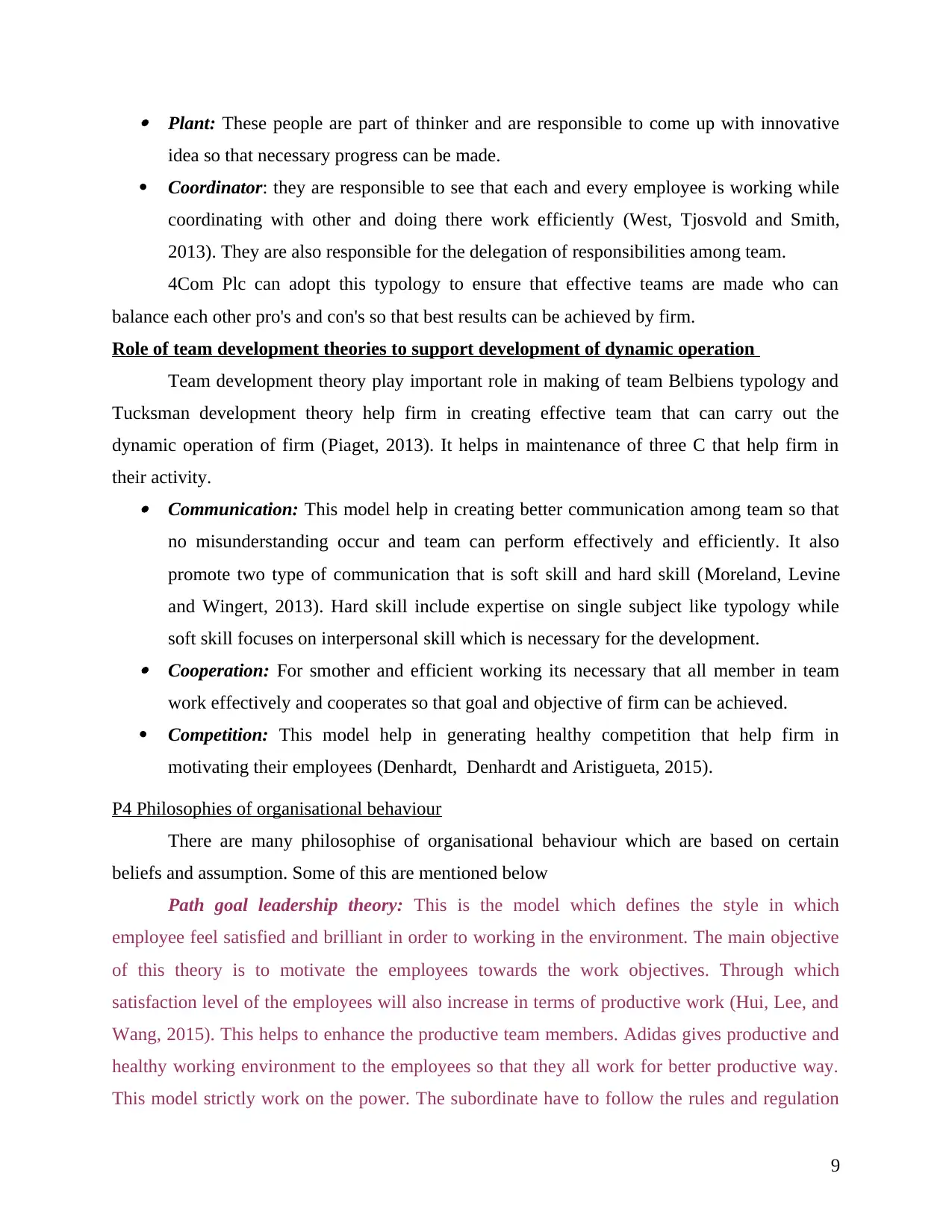
Plant: These people are part of thinker and are responsible to come up with innovative
idea so that necessary progress can be made.
Coordinator: they are responsible to see that each and every employee is working while
coordinating with other and doing there work efficiently (West, Tjosvold and Smith,
2013). They are also responsible for the delegation of responsibilities among team.
4Com Plc can adopt this typology to ensure that effective teams are made who can
balance each other pro's and con's so that best results can be achieved by firm.
Role of team development theories to support development of dynamic operation
Team development theory play important role in making of team Belbiens typology and
Tucksman development theory help firm in creating effective team that can carry out the
dynamic operation of firm (Piaget, 2013). It helps in maintenance of three C that help firm in
their activity. Communication: This model help in creating better communication among team so that
no misunderstanding occur and team can perform effectively and efficiently. It also
promote two type of communication that is soft skill and hard skill (Moreland, Levine
and Wingert, 2013). Hard skill include expertise on single subject like typology while
soft skill focuses on interpersonal skill which is necessary for the development. Cooperation: For smother and efficient working its necessary that all member in team
work effectively and cooperates so that goal and objective of firm can be achieved.
Competition: This model help in generating healthy competition that help firm in
motivating their employees (Denhardt, Denhardt and Aristigueta, 2015).
P4 Philosophies of organisational behaviour
There are many philosophise of organisational behaviour which are based on certain
beliefs and assumption. Some of this are mentioned below
Path goal leadership theory: This is the model which defines the style in which
employee feel satisfied and brilliant in order to working in the environment. The main objective
of this theory is to motivate the employees towards the work objectives. Through which
satisfaction level of the employees will also increase in terms of productive work (Hui, Lee, and
Wang, 2015). This helps to enhance the productive team members. Adidas gives productive and
healthy working environment to the employees so that they all work for better productive way.
This model strictly work on the power. The subordinate have to follow the rules and regulation
9
idea so that necessary progress can be made.
Coordinator: they are responsible to see that each and every employee is working while
coordinating with other and doing there work efficiently (West, Tjosvold and Smith,
2013). They are also responsible for the delegation of responsibilities among team.
4Com Plc can adopt this typology to ensure that effective teams are made who can
balance each other pro's and con's so that best results can be achieved by firm.
Role of team development theories to support development of dynamic operation
Team development theory play important role in making of team Belbiens typology and
Tucksman development theory help firm in creating effective team that can carry out the
dynamic operation of firm (Piaget, 2013). It helps in maintenance of three C that help firm in
their activity. Communication: This model help in creating better communication among team so that
no misunderstanding occur and team can perform effectively and efficiently. It also
promote two type of communication that is soft skill and hard skill (Moreland, Levine
and Wingert, 2013). Hard skill include expertise on single subject like typology while
soft skill focuses on interpersonal skill which is necessary for the development. Cooperation: For smother and efficient working its necessary that all member in team
work effectively and cooperates so that goal and objective of firm can be achieved.
Competition: This model help in generating healthy competition that help firm in
motivating their employees (Denhardt, Denhardt and Aristigueta, 2015).
P4 Philosophies of organisational behaviour
There are many philosophise of organisational behaviour which are based on certain
beliefs and assumption. Some of this are mentioned below
Path goal leadership theory: This is the model which defines the style in which
employee feel satisfied and brilliant in order to working in the environment. The main objective
of this theory is to motivate the employees towards the work objectives. Through which
satisfaction level of the employees will also increase in terms of productive work (Hui, Lee, and
Wang, 2015). This helps to enhance the productive team members. Adidas gives productive and
healthy working environment to the employees so that they all work for better productive way.
This model strictly work on the power. The subordinate have to follow the rules and regulation
9
⊘ This is a preview!⊘
Do you want full access?
Subscribe today to unlock all pages.

Trusted by 1+ million students worldwide
1 out of 17
Related Documents
Your All-in-One AI-Powered Toolkit for Academic Success.
+13062052269
info@desklib.com
Available 24*7 on WhatsApp / Email
![[object Object]](/_next/static/media/star-bottom.7253800d.svg)
Unlock your academic potential
Copyright © 2020–2026 A2Z Services. All Rights Reserved. Developed and managed by ZUCOL.





